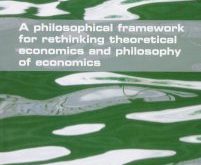Rational expectations — the triumph of ideology over science For more than 20 years, economists were enthralled by so-called “rational expectations” models which assumed that all participants have the same (if not perfect) information and act perfectly rationally, that markets are perfectly efficient, that unemployment never exists (except when caused by greedy unions or government minimum wages), and where there is never any credit rationing. That such...
Read More »The Sonnenschein-Mantel-Debreu Theorem
SMD theory means that assumptions guaranteeing good behavior at the microeconomic level do not carry over to the aggregate level or to qualitative features of the equilibrium. It has been difficult to make progress on the elaborations of general equilibrium theory that were put forth in Arrow and Hahn 1971 … Fifteen years after General Competitive Analysis, Arrow (1986) stated that the hypothesis of rationality had few implications at the aggregate level. Kirman (1989) held...
Read More »Economy Studies: A Guide to Rethinking Economics Education
Economy Studies: A Guide to Rethinking Economics Education .[embedded content]
Read More »La théorie du ruissellement
.[embedded content]
Read More »What killed macroeconomics?
The COVID-19 pandemic impelled governments to fall back on “fiscal Keynesianism,” because there was no way that just increasing the quantity of money could lead to the reopening of businesses that were prevented by law from doing so. Fiscal Keynesianism in the big lockdown meant issuing Treasury payments to people prevented from working. But now that the economy has reopened, the practical rationale for monetary and fiscal expansion has disappeared. Mainstream financial...
Read More »More than economists
Veblen, Keynes, and Hirschman were more than economists because they practiced their economics from a standpoint outside the profession, using it to criticize not only the assumption of rational self-interest, but also the consequences of economists’ indifference to “preferences.” Veblen’s standpoint was explicitly religious; he was still of a believing generation. Keynes, too, was an ethicist. G.E. Moore’s Principia Ethica remained what he called his “religion under the...
Read More »Rethinking economics
The incorporation of new information makes sense only if the future is to be similar to the past. Any kind of empirical test, whatever form it adopts, will not make sense, however, if the world is uncertain because in such a world induction does not work. Past experience is not a useful guide to guess the future in these conditions (it only serves when the future, somehow, is already implicit in the present) … I believe the only way to use past experience is to assume that the...
Read More »Making sense of economics
Making sense of economics Robert Lucas, one of the most creative model-builders, tells a story about his undergraduate encounter with Gregor Mendel’s model of genetic inheritance. He liked the Mendelian model—“you could work out predictions that would surprise you”—though not the lab work breeding fruit flies to test it. (Economists are not big on mucking around in the real world.) Over the weekend, he enjoyed writing a paper comparing the model’s...
Read More »20 références d’économie incontournables
20 références d’économie incontournables .[embedded content]
Read More »A Currency-Issuing Government Must Spend Before Non-Government Can Meet Its Net Financial Liabilities
In reaction to MMT statements that government spending must occur before taxes can be paid, it is sometimes noted that a household could pay taxes by borrowing from a bank that subsequently obtains reserves from the central bank. Whether this is true from inception of a modern money system will depend on the terms set down by the central bank in advancing reserves to banks. But supposing the terms are permissive, would it change anything of macroeconomic significance? Let’s take a brief...
Read More » Heterodox
Heterodox







